|
|
|
Sort Order |
|
|
|
Items / Page
|
|
|
|
|
|
|
| Srl | Item |
| 1 |
ID:
139628
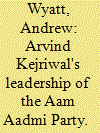

|
|
|
|
|
| Summary/Abstract |
The Aam Aadmi Party (AAP) made its national debut in 2014. Arvind Kejriwal, the National Convenor and a founding leader of the AAP, had a decisive impact on the character of the party. This paper reflects on the significance of Kejriwal's leadership in relation to the literature on party systems and political leadership. In 2014, he attempted to open up a new political cleavage and add a new party to the national party system. His entrepreneurial activity drew attention to the issues of corruption and governance. Kejriwal's political leadership is assessed in terms of his ability to set objectives for the party, his interaction with followers, his efforts to represent those followers and the development of party institutions. Kejriwal's performance as a party leader in 2014 was uneven. The outcome of the Lok Sabha elections exposed the geographical limits of Kejriwal's appeal even as he attempted to provide national leadership.
|
|
|
|
|
|
|
|
|
|
|
|
|
|
|
|
| 2 |
ID:
073689
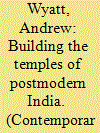

|
|
|
|
|
| Publication |
2005.
|
| Summary/Abstract |
This article surveys the place of the economy in constructions of Indian national identity. The theme of physical construction in the literal and metaphorical building of the Indian national economy is explored. New iterations of this longstanding theme are located in an account of a new narrative of India's 'imagined economy'. The 'India Shining' political advertising campaign of 2004 is understood as an encapsulation of the new economic imaginary. The ongoing relevance of the substance of the India Shining campaign is demonstrated and linked to concerns to establish an India as an international brand. Changes in the Indian economy are linked to an account of the postmodern condition.
|
|
|
|
|
|
|
|
|
|
|
|
|
|
|
|
| 3 |
ID:
107748
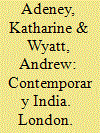

|
|
|
|
|
| Publication |
London, Palgrave Macmillan, 2011.
|
| Description |
xvii, 280p.
|
| Standard Number |
9780230394216
|
|
|
|
|
|
|
|
|
|
|
|
Copies: C:1/I:0,R:0,Q:0
Circulation
| Accession# | Call# | Current Location | Status | Policy | Location |
| 056271 | 320.54/ADE 056271 | Main | On Shelf | General | |
|
|
|
|
| 4 |
ID:
046033
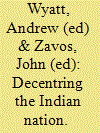

|
|
|
|
|
| Publication |
London, Frank Cass, 2003.
|
| Description |
144p.
|
| Standard Number |
071468323X
|
|
|
|
|
|
|
|
|
|
|
|
Copies: C:1/I:0,R:0,Q:0
Circulation
| Accession# | Call# | Current Location | Status | Policy | Location |
| 046802 | 320.80954/WYA 046802 | Main | On Shelf | General | |
|
|
|
|
| 5 |
ID:
180898
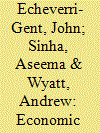

|
|
|
|
|
| Summary/Abstract |
Narendra Modi came to power in 2014 promising robust economic management and more employment. The campaign promise of “maximum governance, minimum government,” created hope that Modi would transform India’s economy by removing obstacles to growth and job creation. We assess the Modi government’s economic policies from 2014–2019 focusing on salient initiatives like demonetization, bankruptcy law, GST reforms, and “Make in India.” We argue that Modi’s economic policies must be understood, first and foremost, as a political strategy to build political support and ensure the BJP’s hegemony through the next decade. In addition, we show that Modi’s success in building his personal image as a decisive leader perversely triggered institutional changes such as centralization of decision-making and political management of information that diminished India’s state capacity and led to policies that failed to address, and in many cases exacerbated, India’s economic problems.
|
|
|
|
|
|
|
|
|
|
|
|
|
|
|
|
| 6 |
ID:
019675
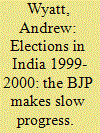

|
|
|
|
|
| Publication |
July 2001.
|
| Description |
379-390
|
| Summary/Abstract |
India's 1998 general elections produced a hung parliament in which the Hindu nationalist Bharatiya Janata Party (BJP) was the largest party. The government was a minority administration in which a number of individual parties were in a pivotal position. After a confidence vote a year later the government fell and, when fresh elections were scheduled for September 1999, it was decided that a number of state assembly elections should be held at the same time. The slow disintegration of the centrist Janata Dal, the rise of the BJP and the emergence of regional parties on the national stage illustrate the collapse of the dominant Congress party system.
|
|
|
|
|
|
|
|
|
|
|
|
|
|
|
|
| 7 |
ID:
152460
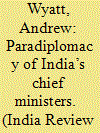

|
|
|
|
|
| Summary/Abstract |
Since the mid-1990s, state governments within India’s federal system have taken a greater interest in foreign relations. They have sought indirect influence by lobbying the central government to take account of their preferences and direct influence by seeking investment and making links with international organizations and other national and subnational governments. This article considers how chief ministers engage in parallel diplomacy noting how they draw on regional cultural resources and make connections with a regionally defined diaspora. The article finds that some chief ministers have embraced the role of “chief diplomat,” while others take a more discreet approach to international activity. Comparing the cases of Andhra Pradesh, Kerala, and Tamil Nadu reveals the political logic for expanding, de-emphasizing, or avoiding international engagement.
|
|
|
|
|
|
|
|
|
|
|
|
|
|
|
|
| 8 |
ID:
165249


|
|
|
|
|
| Summary/Abstract |
Political parties in India operate in a federal system. The incentives that encourage parties to form and seek office have a federal structure. Changes in India’s multilevel political system have accommodated the growth of new parties. At the national level small parties have had many opportunities since 1989 to participate in national coalitions. The Pattali Makkal Katchi (PMK), as a small party, has responded to this federal incentive structure. The PMK has been excluded from government in its home state of Tamil Nadu but was frequently a coalition partner of the union government between 1998 and 2009 (being rewarded with cabinet posts). An emerging party leader, Anbumani Ramadoss used his ministerial experience at the centre to enhance his image and prepare for a larger role at the state level. This article shows how fragmentation of the national party system and the different levels of the federal system gives opportunities to small parties to develop.
|
|
|
|
|
|
|
|
|
|
|
|
|
|
|
|
| 9 |
ID:
127072
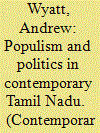

|
|
|
|
|
| Publication |
2013.
|
| Summary/Abstract |
Commentary on Indian politics frequently uses the term populism narrowly to refer to short-term, electorally driven expenditure. However, the term is more insightfully used when referring to an ideological construct that celebrates the importance of the people as an undivided group. Politics in Tamil Nadu has had a strongly populist character since the 1960s with both the Dravida Munnetra Kazhagam (DMK) and All-India Anna DMK (AIADMK) making appeals to the 'people' of the state. In the last decade, the DMK has adjusted its populist appeals to better connect with lower status groups, a constituency traditionally targeted by the AIADMK. The AIADMK re-worked its approach, using a technocratic populist discourse during its campaign to win the 2011 assembly elections, addressing concerns of higher status voters while still acknowledging its poorer supporters. Populist appeals have been adjusted to compensate for political weaknesses in the two governing parties. Economic and social changes since the late 1990s have created opportunities, as well as imperatives, for reworking populist appeals.
|
|
|
|
|
|
|
|
|
|
|
|
|
|
|
|
| 10 |
ID:
165247
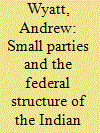

|
|
|
|
|
| Summary/Abstract |
Political parties have proliferated in India since the 1980s. A marked feature of the growth of parties has been the competitiveness of regional parties. Political entrepreneurs have broken away from established parties and formed separate parties that have competed at both state and national levels of the Indian political system. A few of the newly formed parties became strong competitors in their home units, sometimes leading state governments, demonstrating that they were large parties in their own region. A larger number of regional parties won representation in the Lok Sabha after 1989, but most of these newer parties, and some of the older ones, remained small. In the context of coalition politics many small parties were welcomed into national coalitions. Yet a lack of Assembly seats usually resulted in small parties being excluded from government at the state level. This article develops a typology that distinguishes small parties, active in national and state elections, from the larger regional parties and the hundreds of smaller parties registered with the Election Commission. The wider significance of the small parties is assessed in relation to party system change and the everyday conduct of politics.
|
|
|
|
|
|
|
|
|
|
|
|
|
|
|
|
|
|
|
|
|